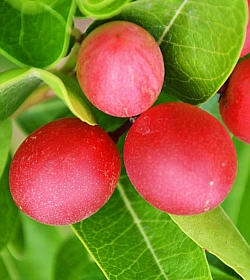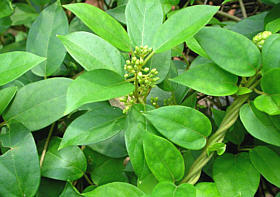|
Traditional: diabetes, weight loss, dyslipidaemia
gastric ulcer, constipation, arthritis, gout

Gymnema
(Gymnema sylvestre)
Gymnema sylvestre extract
with 25% gymnemic acids
Code BOS240 -- Price: $7.50
60 Capsules x 500 mg.
Order Now
 Email
Email
 Summarized Description:
Gymnema Summarized Description:
Gymnema -- is a "traditional ayurvedic." Also called "gurmar"
in Hindi (meaning "destroyer of sugar"), it has been used for thousands
of years in the treatment of diabetes and other blood sugar maladies.
It not only reduces sugar cravings but blocks the intestinal absorption of
glucose, thus making it helpful as a weight loss aid.
 Its contribution to an overall
conscientious weight loss program is aided by the fact that it also
cuts the amount of carbohydrates stored in fat stores, increases the
carbs burned for energy, reducing fat stores and increasing energy levels.
Because of its mild diuretic effect, a resulting reduction in water retention
also helps with weight loss.
 Other common uses include
constipation, stomachache, liver disorders, gastric ulcers, gout, and rheumatoid arthritis.
Uses & Protocols
 Take under the advisement
of your naturopath or other health care practitioner. Recommended dosage
ranges from 350 to 600 mg., with better results from taking the
herb throughout the day. For this reason we recommend taking one capsule,
twice daily, with meals. This approach also takes advantage of the fact
that the most active medicinal in the herb, gymnemic acid, has a cumulative
and summative effect, such that benefits accrue with time. Conversely,
a lax approach involving "starting and stopping" produces less significant
results. Take under the advisement
of your naturopath or other health care practitioner. Recommended dosage
ranges from 350 to 600 mg., with better results from taking the
herb throughout the day. For this reason we recommend taking one capsule,
twice daily, with meals. This approach also takes advantage of the fact
that the most active medicinal in the herb, gymnemic acid, has a cumulative
and summative effect, such that benefits accrue with time. Conversely,
a lax approach involving "starting and stopping" produces less significant
results.
Contraindications
 Because gymnema has blood sugar lowering properties,
it should not be taken by those using anti-hyperglycemic drugs or similar diabetic
medication without practitioner oversight. Additionally, because research
related to the herb's suitable for small children or woman who are pregnant
or lactating, we do not recommend this herb to those falling in these categories.
Additionally, those with milkweed allergies are advised not to take this herb,
as well as those taking antidepressants. We advise that those taking aspirin,
white willow bark, or St. John's Wart avoid this herb, as well, to avoid
the combined blood sugar lowering effects. Combined and/or cumulative use
could lead to hypoglycemia. Because gymnema has blood sugar lowering properties,
it should not be taken by those using anti-hyperglycemic drugs or similar diabetic
medication without practitioner oversight. Additionally, because research
related to the herb's suitable for small children or woman who are pregnant
or lactating, we do not recommend this herb to those falling in these categories.
Additionally, those with milkweed allergies are advised not to take this herb,
as well as those taking antidepressants. We advise that those taking aspirin,
white willow bark, or St. John's Wart avoid this herb, as well, to avoid
the combined blood sugar lowering effects. Combined and/or cumulative use
could lead to hypoglycemia.

Medicinal Activities
 Further information for practitioners:
Below is a list of the medical activities andindications for
Gymnema from varied sources. Further information for practitioners:
Below is a list of the medical activities andindications for
Gymnema from varied sources.
- Antiallergic
- Antibacterial
- Antifungal
- Antiinflammatory
- Antimicrobial, general
- Antineoplastic
- Antistress
- Antiulcerogenic
- Antiviral
- Appetite suppression
- Balances blood glucose levels
- Blocks sugar absorption
- Circulatory system stimulant
- Curbs desire for sweets
- Diuretic
- Immunomodulatory
- Laxative
- Neuroprotective
- Obesity
- Pancreas-protective
- Triglycerides, reduces
Indications
- Anemia
- Arthritis, rheumatoid
- Asthma
- Cancer, general
- Cardiopathy
- Cholesterol, high - (improves HDL-to-LDL cholesterol)
- Constipation
- Diabetes
- Dyslipidaemia
- Gastric Ulcer
- Gout
- Hypercholesterolemia
- Indigestion
- Obesity
- Osteoporosis
- Ulcers
References
- Baskaran, K., et al. "Antidiabetic effect on a leaf extract from Gymnema sylvestre in non-insulin-dependent diabetes
mellitus patients." J Ethnopharmacol. 1990 Oct;30(3):295-300.
- Brala, PM and Hagan, RL. "Effects of sweetness perception and caloric value of preload on short term intake."
Physiol Behav. 1983 Jan;30(1):1-9.
- Int J Crude Drug Res, 86:24[Dec]: 171-176.
- Kurihara Y. "Characteristics of antisweet substances, sweet proteins, and sweetness-inducing proteins."
Crit Rev Food Sci Nutr. 1992;32(3):231-52.
- Luo, H, et al. "Decreased bodyweight without rebound and regulated lipoprotein metabolism
by gymnemate in genetic multifactor syndrome." Mol Cell Biochem. 2007:299(1-2):93-8.
- Sahu, N, et al. "Triterpenoid Saponins
from Gymnema sylvestre." Phytochem. 1996;41:1181-85.
- Zarelli, A., et. al.
"
History of gymnemic acid, a molecule that does not exist."
Nat Prod Commun. 2014 Oct;9(10):1429-32.
(Note: Gymnemic acids are a "very complex mixture of dozens of substances.")
- Other specifics taken from select PubMed studies -- see right column.
|

 To U.S. Users: To U.S. Users: This product
have not been evaluated by the U.S. Food & Drug Administration.
It is not intended to diagnose, treat, cure, or prevent any disease.
|
 Recent Studies on Gymnema
Recent Studies on Gymnema
Sourced from PubMed
 Disclaimer: Disclaimer: The following citations provide findings on the
properties of Gymnema and offer insights into prospective areas of future research.
These findings should not be inferred to provide the basis of medicinal claims,
nor should they be relied upon by the public, as such. Readers who want full access to
the PubMed database are encouraged to
register with NCBI.
 As of Dec., 2017, there were 267 citations posted on Gymnema.
Below we list a few of the more notable:
-
A systematic review of Gymnema sylvestre in obesity and diabetes management. (2014)
Several components extracted from Gymnema prevent the accumulation of triglycerides in muscle and liver,
and also decrease fatty acid accumulation in the circulation. In this paper, an attempt has been made to
review the effects of various extracts from Gymnema sylvestre in the regulation of carbohydrate and lipid metabolism
in both animal and clinical studies.
-
Phytochemical and pharmacological properties of Gymnema sylvestre: an important medicinal plant. (2014)
Abstract: "Gymnema sylvestre (Asclepiadaceae), popularly known as "gurmar" for its distinct property as sugar destroyer,
is a reputed herb in the Ayurvedic system of medicine. The phytoconstituents responsible for sweet suppression activity
includes triterpene saponins known as gymnemic acids, gymnemasaponins, and a polypeptide, gurmarin. The herb exhibits a
broad range of therapeutic effects as an effective natural remedy for diabetes, besides being used for arthritis, diuretic,
anemia, osteoporosis, hypercholesterolemia, cardiopathy, asthma, constipation, microbial infections, indigestion, and
anti-inflammatory. G. sylvestre has good prospects in the treatment of diabetes as it shows positive effects on blood sugar
homeostasis, controls sugar cravings, and promotes regeneration of pancreas. The herbal extract is used in dietary supplements
since it reduces body weight, blood cholesterol, and triglyceride levels and holds great prospects in dietary as well as
pharmacological applications. This review explores the transition of a traditional therapeutic to a modern contemporary
medication with an overview of phytochemistry and pharmacological activities of the herb and its phytoconstituents."
-
Gymnema sylvestre R. Br., an Indian medicinal herb: traditional uses, chemical composition, and biological activity. (2015)
-
Potential anticancer properties of bioactive compounds of Gymnema sylvestre and its biofunctionalized silver nanoparticles. (2014)
Conclusion: "Our results show that the anticancer properties of the bioactive compounds of G. sylvestre can be enhanced
through biofunctionalizing the SNPs using the bioactive compounds present in the plant extract without compromising their
medicinal properties."
-
Inhibitory Effects of Gymnema (Gymnema sylvestre) Leaves on Tumour Promotion in Two-Stage Mouse Skin Carcinogenesis. (2014)
-
Antihyperglycemic drug Gymnema sylvestre also shows anticancer potentials in human melanoma A375 cells via reactive oxygen
species generation and mitochondria-dependent caspase pathway. (2013)
Conclusion: Overall results indicate GS to have significant anticancer effect on A375 cells apart from its reported antidiabetic
effect, indicating possibility of its palliative use in patients with symptoms of both the diseases.
-
Hypolipidaemic Effects of Gymnema sylvestre on High Fat Diet Induced Dyslipidaemia in Wistar Rats (2017)
Confirms the effective hypolipidamic effects of Gymnema.
-
In vitro antimicrobial potential of extracts and phytoconstituents from Gymnema sylvestre R.Br. leaves and
their biosafety evaluation. (2017)
-
The Effects of Gymnema sylvestre in High-Fat Diet-Induced Metabolic Disorders. (2017)
"Our results support the existence of a relationship between the HFD induced insulin resistance, adipose dysfunction and liver steatosis.
In conclusion, GS works as a functional dietary supplement with preventative effects against metabolic disorder."
-
Suppression of Oral Sweet Taste Sensation with Gymnema sylvestre Affects Postprandial Gastrointestinal
Blood Flow and Gastric Emptying in Humans (2017)
-
Gymnema sylvestre for Diabetes: From Traditional Herb to Future's Therapeutic. (2017)
" The present article discusses the significance of G. sylvestre in diabetes management,
the herbal-formulations from the herb together with its standardization and clinical trials
on animal models, and why Peroxisome Proliferator Activated Receptor gamma (PPARγ) may serve
as a prospective molecular target for Gymnemic acid analogs. Such studies would define the
molecular basis of bioactive molecules which would aid in the development of natural product
based therapeutics in the treatment of diabetes. "
-
Immunomodulatory Effect of Gymnema sylvestre (R.Br.) Leaf Extract: An In Vitro Study in Rat Model. (2015)
-
Neuroprotective effects of Gymnema sylvestre on streptozotocin-induced diabetic neuropathy in rats. (2015)
"Results: Tthe results demonstrated that the neuroprotective effect of Gs may be associated with the inhibitory effect
on the excessive activation of inflammatory molecules and oxidative stress mediators."
-
In vivo anti-ulcer, anti-stress, anti-allergic, and functional properties of gymnemic acid isolated from Gymnema sylvestre R Br.
(2014) Conclusions: "Conclusions: The aqueous extracts of the leaves of Gymnema sylvestre possess anti ulcerogenic,
anti allergic, anti stress properties that may be due to cytoprotective mechanism. These results support the ethno medical
uses of the plant in the treatment of gastric ulcer.
-
Phytochemical analysis of Gymnema sylvestre and evaluation of its antimicrobial activity. (2013)
"The chloroform extracts of aerial and root parts of G. sylvestre exhibited higher antimicrobial activity
as compared to diethyl ether and acetone."
|




